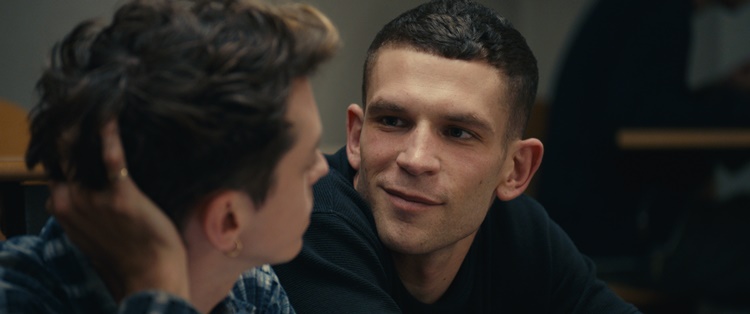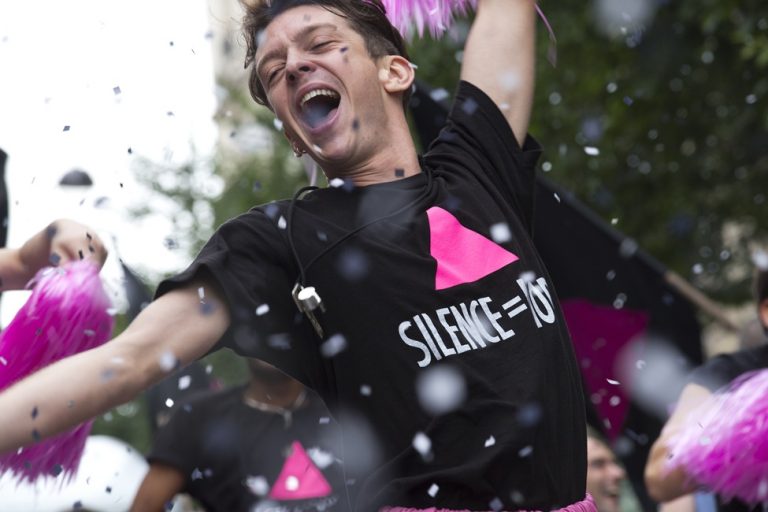Cinema Bíó Paradís, in collaboration with HIV Iceland, will premier tonight the gay film “120 Beats per Minute”, a heartfelt French drama about the direct action group ACT UP, who fought for social justice for people with AIDS in the 1990’s. The organizers say the film’s topic is still relevant today.

“The film competed in the main competition at Cannes Film Festival at the 70th anniversary this year,” says Ása Baldursdóttir, program director at Bíó Paradís. “We thought it was so great since it’s a topical film, that it won so many awards, not to mention that it won the Jury award, lead by the marvellous Spanish director Pedro Almodóvar. And we are also very happy that we managed to bring this wonderful film to Iceland, and we can’t wait to follow-up on Reykjavík Pride by theatrically releasing it.”
Could you tell us a little bit about the film? “It’s a human story that touched people’s hearts on a level that I would not expect anyone to walk out without having one or two tears in their eyes,” says Ása. “But it’s also loaded with humor and sex appeal, and erotic moments,” she adds. “I would say that this is one of the best films from Cannes this year!”
“It’s also loaded with humor and sex appeal, and erotic moments. I would say that this is one of the best films from Cannes this year!”
120 Beats per Minute has been praised by critics, with The Telegraph describing it as “a vitally erotic, moving ode to activism,” and along with the Grand Prix at Cannes, it has won the Queer Palm, FIPRESCI and the main prize at the International Cinephile Society Awards. The film is also nominated for the 2017 Lux Film Prize. The director Robin Campillo and co-screenwriter, Philippe Mangeot drew the story on their personal experiences with the ACT UP movement in the 1990’s. Einar Þór Jónsson, who is the director of the organization HIV Iceland as well as being a public health care worker, says the team have created an excellent film.
“Campillo’s take on the story was to create a fantastic film, that is greatly cast with young people who give it all in their performances. It’s a perfect portrait of the inside of a movement that was a great power for the discussion on AIDS in the world and still has a long-lasting effect on our societies,” he says. “I think filmmakers are the strongest when they tell stories of something that they know themselves. Film-making is a powerful tool to tell stories, and I think it’s fantastic when you can share your story with the world like that.”
Ása agrees with Einar on the importance of the story. “We live in ever-changing political times and films like these are powerful in bringing stories to the world, internationally,“ she says. “I think the best filmmakers draw from their experience. Campillo could have made a boring documentary, but he chose to make a great fictional film based on his own experience. It’s a strong film because it still has a huge purpose today, the message is still relevant!”

In what way is the film’s message still relevant? “Well, in historic context we look at those who fought the cause for us as heroes in the community, those who paved the path for us who came later,” says Einar. “And what this film teaches us is what activism means, even though it’s only loosely based on the Paris group and ACT UP. Further more the film shows us that HIV is not about a closed circuit of people diagnosed with HIV, it’s about all of us. So we can always look at films like this one to gain insight and knowledge. Apart from that, it is a perfect tool to fight prejudice and ignorance.”

“It’s a fantastic film, that is greatly cast with young people who give it all in their performances. It’s a perfect portrait of the inside of a movement that was a great power.”
So is there still prejudice in Iceland towards HIV positive people? “Yes, there is still prejudice towards people living with HIV today in Iceland, but it’s difficult to say if it’s a lot or not. People living with HIV are stigmatized, which is often painful and makes people vulnerable. And even though many people with HIV are living a normal life with amity, friends and work, many others are not that lucky and are dealing with depression, anxiety, isolation etc.,” says Einar, who hopes that the screening of the film and an Q&A with the audience after the premier tonight, Friday, August 25, will help eradicate the stigma and prejudice towards HIV positive people in Iceland.


